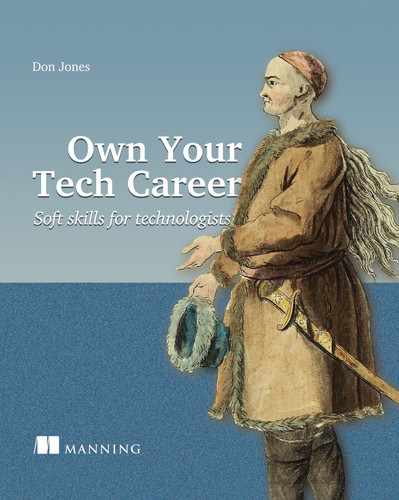0%
28Chapters
0-1Hours read
0kTotal Words
Own Your Tech Career: Soft skills for technologists helps you get what you want out of your technology career. You’ll start by defining your ambition—whether that’s a salary, a job title, a flexible schedule, or something else. Once you know where you’re going, this book’s adaptable advice guides your journey. You’ll learn conflict resolution and teamwork, master nine rules of professionalism, and build the confidence and skill you need to stay on the path you’ve set for yourself.
Table of Contents
- Own Your Tech Career
- Copyright
- contents
- front matter
- Introduction
- 1 Own your career
- 2 Build and maintain your brand
- 3 Network
- 4 Be part of a technology community
- 5 Keep your tech skills fresh and relevant
- 6 Show up as a professional
- 7 Manage your time
- 8 Handle remote work
- 9 Be a team player
- 10 Be a team leader
- 10.1 The decision to lead
- 10.2 Leadership vs. management
- 10.3 The leader’s path
- 10.4 Getting into their context
- 10.5 Leading positively
- 10.6 Mistakes leaders make
- 10.7 Leadership beyond leading
- 10.8 Before moving into leadership
- 10.8.1 Don’t get promoted to your level of incompetence
- 10.8.2 Learn leadership
- 10.8.3 Measure your own success
- 10.9 Further reading
- 10.10 Action items
- 11 Solve problems
- 12 Conquer written communications
- 12.1 Communicating is telling a story
- 12.1.1 The rules of storytelling
- 12.1.2 Applying storytelling to business communication
- 12.1.3 What about mundane, everyday communication?
- 12.2 Facing our fear of communicating
- 12.2.1 Analyze the causes of your fear
- 12.2.2 Address the causes of your fear
- 12.2.3 Conquer fear in written communications
- 12.3 Applying structure to your storytelling
- 12.4 Practice, practice, practice
- 12.5 Common written defeaters
- 12.5.1 Avoid passive voice
- 12.5.2 Prune that flowery garden
- 12.6 Action items
- 13 Conquer verbal communications
- 14 Resolve conflicts
- 15 Be a data-driven, critical thinker
- 16 Understand how businesses work
- 16.1 Businesses are people too
- 16.1.1 Businesses and their relationships
- 16.1.2 Customers and employees
- 16.1.3 One-sided relationships
- 16.1.4 Dealing with changes in the relationship
- 16.2 How businesses really make money
- 16.3 What does your business sell?
- 16.3.1 Example 1: Terri’s International Bulbs
- 16.3.2 Example 2: Martin’s Theme Parks
- 16.3.3 Example 3: Pat’s Fruity Clothing
- 16.3.4 Know the details of the business
- 16.4 Understanding risk and reward
- 16.5 Further reading
- 16.6 Action items
- 17 Be a better decision-maker
- 17.1 Deciding who decides: Decision-making frameworks
- 17.2 Deciding what to do: OKRs, rocks, and pebbles
- 17.2.1 Rocks and pebbles
- 17.2.2 OKRs
- 17.2.3 Priorities, priorities
- 17.3 Deciding what to drop: Opportunity cost
- 17.4 Deciding what’s enough: Good, better, best
- 17.5 Deciding what to believe: Being data-driven
- 17.6 Deciding together: How to negotiate
- 17.7 Further reading
- 17.8 Action items
- 18 Help others
- 18.1 Why help?
- 18.2 Yes, you can
- 18.2.1 The toxic relationships that keep us from teaching
- 18.2.2 You are definitely worthy of teaching
- 18.3 How humans learn
- 18.4 The value of repetition
- 18.5 Getting in and doing it
- 18.6 Why analogies work . . . and how they can fail
- 18.7 Do it like Socrates
- 18.8 The importance of sequencing
- 18.9 Rest time is crucial
- 18.10 Further reading
- 18.11 Action items
- 19 Be prepared for anything
- 20 Business math and terminology for technologists
- 21 Tools for the modern job hunt
- 21.1 Job hunt tasks to do now
- 21.2 Review your brand
- 21.2.1 Your professional brand and the job hunt
- 21.2.2 Reviewing your public footprint
- 21.2.3 How would others describe your brand?
- 21.3 Update your résumé
- 21.3.1 Résumé rules
- 21.3.2 Starting your résumé
- 21.3.3 Every résumé is unique
- 21.3.4 Analyze the job posting
- 21.3.5 Writing your résumé
- 21.3.6 Formatting your résumé
- 21.3.7 Should you hire a résumé writer?
- 21.4 Nailing the interview
- 21.5 Understanding compensation packages
- 21.5.1 Compensation package elements
- 21.5.2 Negotiating your compensation package
- 21.6 Further reading
- 21.7 Action items
- index
